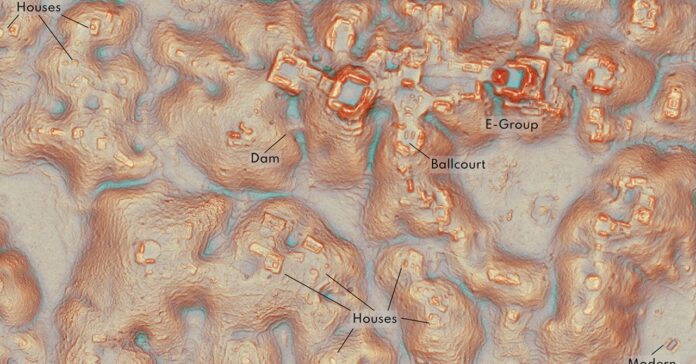A Mayan town misplaced within the dense jungle of southern Mexico has been published. The invention happened within the southeastern state of Campeche, and archaeologists have named it Valeriana, after a close-by freshwater lagoon.
“The bigger of Valeriana’s two enormous precincts has all of the hallmarks of a vintage Mayan political capital: enclosed plazas attached via a wide causeway; temple pyramids; a ball court docket; a reservoir shaped via damming an arroyo (a seasonal watercourse); and a likely E-Team assemblage, an architectural association that normally signifies a founding date previous to AD 150,” says the find out about, revealed within the magazine Antiquity.
The town’s discovery did not require breaking during the jungle with machetes or patiently excavating with brushes and spatulas. Nor did researchers want tape measures, binoculars, or compasses to seek out their method during the thick foliage. As a substitute, they hired state of the art generation: lasers, drones, and satellite tv for pc maps. With those equipment, they came upon a town hidden for hundreds of years underneath the thick Mexican jungle, unearthing pyramids, enclosed plazas, and an historic reservoir.
Luke Auld-Thomas, an anthropologist at Northern Arizona College, made the invention. His research published an enormous community of in the past unexplored settlements.
Auld-Thomas and his fellow researchers have succeeded in mapping town underneath the jungle due to airborne laser scanning, higher referred to as lidar (mild detection and varying), a remote-sensing method that makes use of pulsed lasers and different information amassed thru flyovers that may generate correct third-dimensional fashions of floor options, revolutionizing the best way archaeologists discover the hidden previous.
Laser pulses generate a topographic map in a way very similar to how a bat makes use of echolocation: Laser mild is fired from an airplane, bounces off gadgets at the floor, and returns to the detector positioned at the underside of the airplane. In Mexico, even if just a small fraction of the pulses go during the dense jungle, the massive collection of pulses emitted permits sufficient mild to achieve the bottom, making a map with a answer of as much as 1 meter. In accordance with the timing and depth of the returning pulses, the detector can map the contours of the terrain, revealing hills, ditches, and historic ruins coated in plants. The generation may be being built-in into self reliant automobiles to lend a hand them steer clear of crashes.
“For a very long time, our figuring out of the Mayan civilization used to be restricted to a space of a couple of hundred sq. kilometers,” Auld-Thomas says. “This restricted pattern used to be acquired with nice effort, with archaeologists painstakingly scouring each sq. meter, hacking away at plants with machetes, handiest to find they have been status on a pile of rocks that may had been any individual’s space 1,500 years in the past.”





 #shorts #shortsfeed #nature #youtubeshorts #iciness
#shorts #shortsfeed #nature #youtubeshorts #iciness